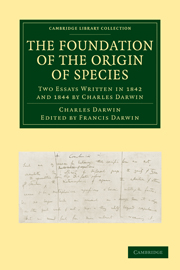Book contents
- Frontmatter
- Contents
- INTRODUCTION
- PART I
- PART II
- PART I
- CHAPTER I ON THE VARIATION OF ORGANIC BEINGS UNDER DOMESTICATION; AND ON THE PRINCIPLES OF SELECTION
- CHAPTER II ON THE VARIATION OF ORGANIC BEINGS IN A WILD STATE; ON THE NATURAL MEANS OF SELECTION; AND ON THE COMPARISON OF DOMESTIC RACES AND TRUE SPECIES
- CHAPTER III ON THE VARIATION OF INSTINCTS AND OTHER MENTAL ATTRIBUTES UNDER DOMESTICATION AND IN STATE OF NATURE; ON THE DIFFICULTIES IN THIS SUBJECT; AND ON ANALOGOUS DIFFICULTIES WITH RESPECT TO CORPOREAL STRUCTURES
- PART II ON THE EVIDENCE FAVOURABLE AND OPPOSED TO THE VIEW THAT SPECIES ARE NATURALLY FORMED RACES, DESCENDED FROM COMMON STOCKS
- INDEX
CHAPTER I - ON THE VARIATION OF ORGANIC BEINGS UNDER DOMESTICATION; AND ON THE PRINCIPLES OF SELECTION
Published online by Cambridge University Press: 07 September 2010
- Frontmatter
- Contents
- INTRODUCTION
- PART I
- PART II
- PART I
- CHAPTER I ON THE VARIATION OF ORGANIC BEINGS UNDER DOMESTICATION; AND ON THE PRINCIPLES OF SELECTION
- CHAPTER II ON THE VARIATION OF ORGANIC BEINGS IN A WILD STATE; ON THE NATURAL MEANS OF SELECTION; AND ON THE COMPARISON OF DOMESTIC RACES AND TRUE SPECIES
- CHAPTER III ON THE VARIATION OF INSTINCTS AND OTHER MENTAL ATTRIBUTES UNDER DOMESTICATION AND IN STATE OF NATURE; ON THE DIFFICULTIES IN THIS SUBJECT; AND ON ANALOGOUS DIFFICULTIES WITH RESPECT TO CORPOREAL STRUCTURES
- PART II ON THE EVIDENCE FAVOURABLE AND OPPOSED TO THE VIEW THAT SPECIES ARE NATURALLY FORMED RACES, DESCENDED FROM COMMON STOCKS
- INDEX
Summary
The most favourable conditions for variation seem to be when organic beings are bred for many generations under domestication: one may infer this from the simple fact of the vast number of races and breeds of almost every plant and animal, which has long been domesticated. Under certain conditions organic beings even during their individual lives become slightly altered from their usual form, size, or other characters: and many of the peculiarities thus acquired are transmitted to their offspring. Thus in animals, the size and vigour of body, fatness, period of maturity, habits of body or consensual movements, habits of mind and temper, are modified or acquired during the life of the individual, and become inherited. There is reason to believe that when long exercise has given to certain muscles great development, or disuse has lessened them, that such development is also inherited. Food and climate will occasionally produce changes in the colour and texture of the external coverings of animals; and certain unknown conditions affect the horns of cattle in parts of Abyssinia; but whether these peculiarities, thus acquired during individual lives, have been inherited, I do not know.
- Type
- Chapter
- Information
- The Foundation of the Origin of SpeciesTwo Essays Written in 1842 and 1844 by Charles Darwin, pp. 55 - 80Publisher: Cambridge University PressPrint publication year: 2009First published in: 1909

